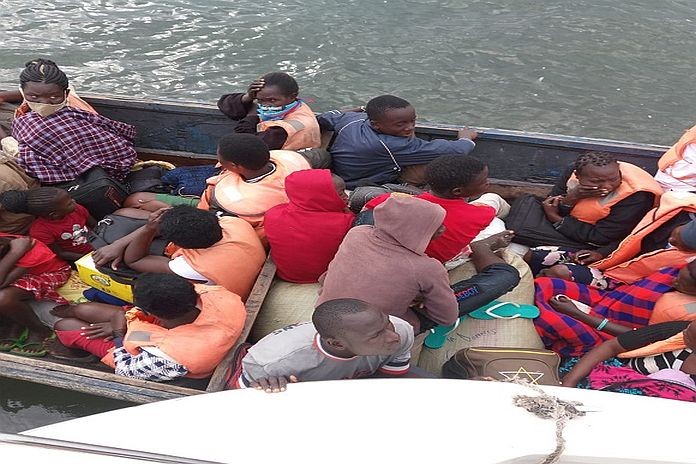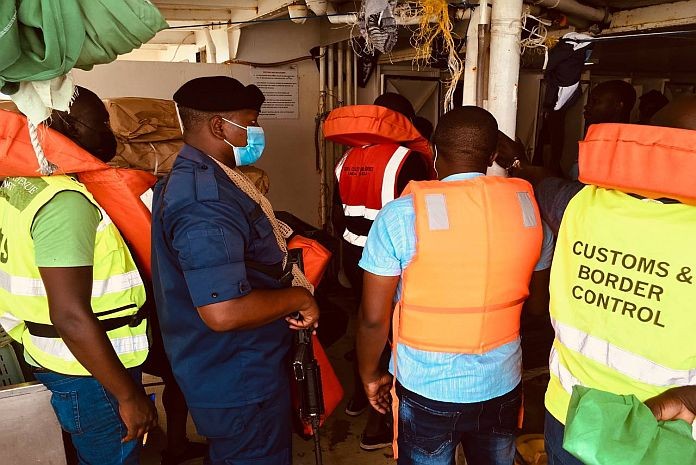LYON, France – Depleting fish stocks are having a detrimental impact on the world’s biodiversity and food chain. According to INTERPOL’s environmental and maritime security teams, which coordinated a five-month intelligence-led operation (June- October 2021) spanning 34 countries and all ‘Seven Seas’, the decrease in marine living resources are also driving a surge in fisheries-related crime.
A total of 1,710 inspections carried out during the one-month tactical phase of Operation IKATERE uncovered over 100 cases of fisheries and other crimes. More than 40 arrest warrants have already been issued, while many investigations remain ongoing.
Nearly one tonne of illicit products were seized worldwide, including protected fish and wildlife species, drugs and explosives. Law enforcement in Montenegro alone recovered more than 20 cylinders of explosives during the operation.
“The use of explosives as an illegal fishing method is a growing trend amongst the industry’s unscrupulous actors, as the progressive depletion of fish stocks pushes vessels to maintain catch rates at any cost,” said Ilana De Wild, INTERPOL’s director of Organized and Emerging Crime.
“Their use also boosts the circulation of explosives that can be used by criminal or terrorist groups. Bomb makers behind terrorist attacks in recent years have been found to also be providing explosives to the illegal fishing industry,” De Wild added.
Illegal, unreported and unregulated (IUU) fishing is one of the greatest threats to the sustainable use of marine resources, one of the United Nations’ (UN) sustainable development goals. Each year, IUU fishing costs the global economy billions of dollars.
According to the Food and Agriculture Organization of the UN (FAO), an estimated 20 percent of the world’s total catch stems from IUU fishing and the amount rises to 40 percent in certain regions, such as the coastal waters of some developing countries.
Criminals use fishing vessels to traffic drugs and people because their nomadic navigation patterns and long periods at sea make it easy for these vessels to blend into the maritime background without suspicion. Criminal networks also use the proceeds of illegal commercial fishing to finance other illicit activities.

Human trafficking and modern slavery are also severe problems in the fishing industry. During Operation IKATERE, 121 men, women and children trafficked on vessels in Lake Victoria were rescued by Kenyan law enforcement.
The operation also confirmed the prevalence of using false documentation – such as forged vessel certificates, fake fishing licenses or false crew documents – to conceal the true nature of a vessel’s activities, launder catches and cover-up cases of labor exploitation or human trafficking.
More than 70 vessels allegedly associated with illegal fishing activities were identified during Operation IKATERE, principally for failing to submit valid fishing licenses for areas in which they were caught fishing.
“The only way to effectively combat the myriad crimes associated with illegal fishing is timely international cooperation between the country inspecting fishing documentation and the country supposed to have issued it,” said Stephen Kavanagh, executive director of Police Services at INTERPOL.
“The broad participation in Operation IKATERE – including landlocked countries such as Rwanda – demonstrates the global commitment to enforcing a sustainable stewardship of marine resources. Our collective sustenance and livelihood depends on it.”
Operation IKATERE was supported at every stage by INTERPOL’s Fisheries Crime Working Group – an international platform for sharing expertise and experience, and developing innovative policing approaches to this crime area.
The Environmental Security Programme and its activities against Illegal fisheries are financially supported by the CCAMLR (Commission for the Conservation of Antarctic Marine Living Resources) Secretariat, the Pew Charitable trusts and the United States Agency for International Development (USAID).





